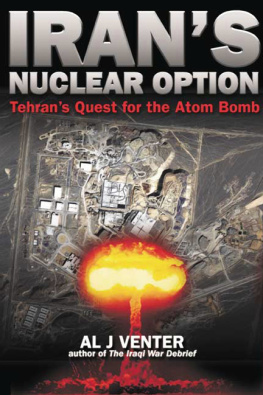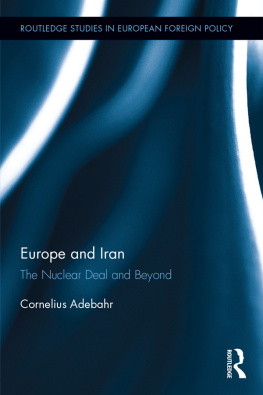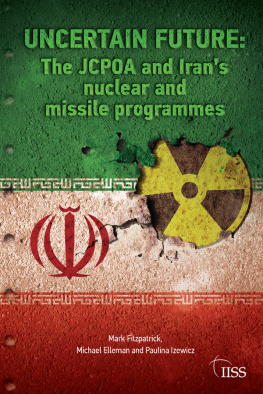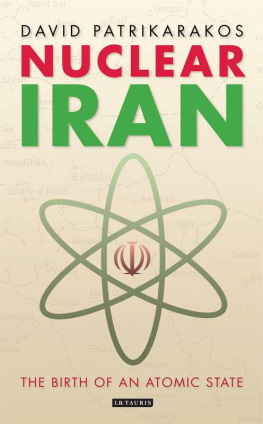Praise for the previous edition of Iran: the Looming Crisis
Considers Europe as the prime mover vis--vis Irans nuclear ambitions. How Europe will use this unaccustomed power is the big question at the heart of this timely book.
Franois Heisbourg, Special Adviser, Fondation pour
la Recherche Stratgique, Paris
This is an important contribution to the debate about Europes approach to Iran. As one would expect, Dr Ottolenghi has written a well-informed, perceptive and sobering book. I hope our European leaders, and those who study this potential flashpoint, will read what he has to say.
General The Lord Charles Guthrie, Chief of the British Defence Staff (1997 2001), Colonel Commandant of the Life Guards and the Special Air Service
How to deal with Iran is one of the most pressing foreign policy issues of the day. Dr Ottolenghi provides a useful guide to the challenge and thoughtful suggestions on how to meet it.
Professor Sir Lawrence Freedman, Professor of War Studies and Vice Principal, Kings College London
For almost three decades, conventional wisdom has presented Iran as a problem for the USA. In this seminal study, Dr Ottolenghi shows that a nuclear-armed Islamic Republic could be more of a threat to Europe, which, in one of those bitter ironies of history, has helped the Khomeinist regime not only to survive but also to build its arsenal of deadly weapons. A work of impeccable scholarship, this book is also a political wake-up call to European democracies.
Amir Taheri, syndicated columnist, former Executive Editor of Kayhan, Irans largest daily paper
Ottolenghi is persuasive in his claim that Iran is very close to acquiring a nuclear bomb, which would allow it to act with impunity against moderate governments in the Middle East and step up the arms race in the region he presents a convincing and well-crafted argument for robust, concerted and carefully targeted sanctions to deal with Irans nuclear expansionism.
The Economist
Iran: the Looming Crisis
Can the West live with Irans nuclear threat?
Emanuele Ottolenghi


This new and revised edition published in 2010
First published as Under a Mushroom Cloud in Great Britain in 2009 by
PROFILE BOOKS LTD
3A Exmouth House
Pine Street
Exmouth Market
London EC1R 0JH
www.profilebooks.com
This eBook edition published in 2010
Copyright Emanuele Ottolenghi 2009, 2010
The moral right of the author has been asserted.
Typeset by MacGuru Ltd
This eBook is copyright material and must not be copied, reproduced, transferred, distributed, leased, licensed or publicly performed or used in any way except as specifically permitted in writing by the publishers, as allowed under the terms and conditions under which it was purchased or as strictly permitted by applicable copyright law. Any unauthorised distribution or use of this text may be a direct infringement of the authors and publishers rights and those responsible may be liable in law accordingly.
A CIP catalogue record for this book is available from the British Library.
eISBN 978 1 84765 457 1
To Eitan and Nathan, my fountains of eternal joy
All warfare is based on deception. When able to attack, we must seem unable; when using our forces, we must seem inactive; when we are near, we must make the enemy believe we are far away.
Sun Tsu, The Art of War
All our nuclear activities have been completely peaceful and transparent.
Mahmoud Ahmadinejad, speech to the General Assembly of the UN, 26 September 2007
About the author
Emanuele Ottolenghi is a Senior Fellow at the Foundation for Defense of Democracies. He was born in Bologna, Italy. A Political Science graduate of the University of Bologna, he obtained his Ph.D. at the Hebrew University of Jerusalem and taught Israel Studies at Oxford from 1999 to 2006. From 2006 to early 2010, he was the director of the Brussels-based Transatlantic Institute. A frequent commentator on Middle East affairs and transatlantic relations for many English-language and Italian publications, he is the author, most recently, of Autodaf: LEuropa, gli Ebrei e lAntisemitismo (Lindau, 2007, in Italian).
Contents
Acknowledgements
This book is the result of more than a year of research, interviews and conversations held in Europe, the USA and Israel with senior government officials, intelligence and security officials, academics and elected leaders. To all those who agreed to speak to me and share their views on the subject of Iran and its nuclear programme, I wish to extend my deepest gratitude. I cannot mention their names often our conversations were held off the record or under the Chatham House rule. I did my best to take their comments, criticism and thoughtful observations into due account and sometimes report them faithfully without revealing their identity. I hope they will recognise themselves and accept my thanks for the immense help they gave me without feeling in any way that our trust was broken.
This work could not have been completed had it not been for the valiant help of many interns and research assistants who helped me write the first edition while at the Transatlantic Institute and subsequently revise it for this second edition at the Foundation for Defense of Democracies. I wish to thank Jesse Bernstein, Jonathan Feldman, Joshua Hantman, Max Kienzerle, Jake Meth, Nate Miller, Margherita Sacerdoti, Benjamin Tankel and Rachel Weinberger for their invaluable support in finding, verifying and corroborating so much of the sometimes hard-to-assess evidence available in open sources.
My special thanks also to Helen and Douglas Davis, both dear friends and colleagues, whose initial dedication to this project made the first edition of this book possible.
This second edition could not have come to fruition had it not been for the encouragement and support of the Foundation for Defense of Democracies and my colleagues at FDD to Mark Dubowitz and Jonathan Schanzer in particular, my deepest thanks for their help, editorial suggestions, encouragement, and, most of all, for believing in this book. My thanks also to Alan Mendoza and the Henry Jackson Society for their support of the first edition, and to my former colleague Jason Isaacson, whose editing touch was always light and whose support for my stubborn pursuit of this project never wavered. My thanks also to Paul Forty at Profile Books, who patiently and thoroughly managed the editing of the final manuscript, twice now, always in good spirits and with a skilful touch. Needless to say, I alone am responsible for whats written in the coming pages.
Last, but not least, a special thanks to my family my wife Nicole, first and foremost who stood by me through the long and arduous journey that writing and then rewriting this work became. She helped me, assisted me and kept smiling when I needed it most.
Brussels
May 2010
Introduction
Since Irans illicit nuclear programme was exposed in 2002, Tehran has defied the international community and doggedly continued pursuing its nuclear goals. It has turned down tantalising economic incentives, borne the brunt of increasing diplomatic isolation and incurred a high price in sanctions. What, then, is impelling Tehrans nuclear quest? Is it the hope of wiping Israel off the map? Is it the dream of finally establishing Shia predominance over Sunni Islam? Or is this a search for a trigger to usher in a millenarian Shia vision the final eschatological act in the war between the City of God and the City of Man?
Next page






